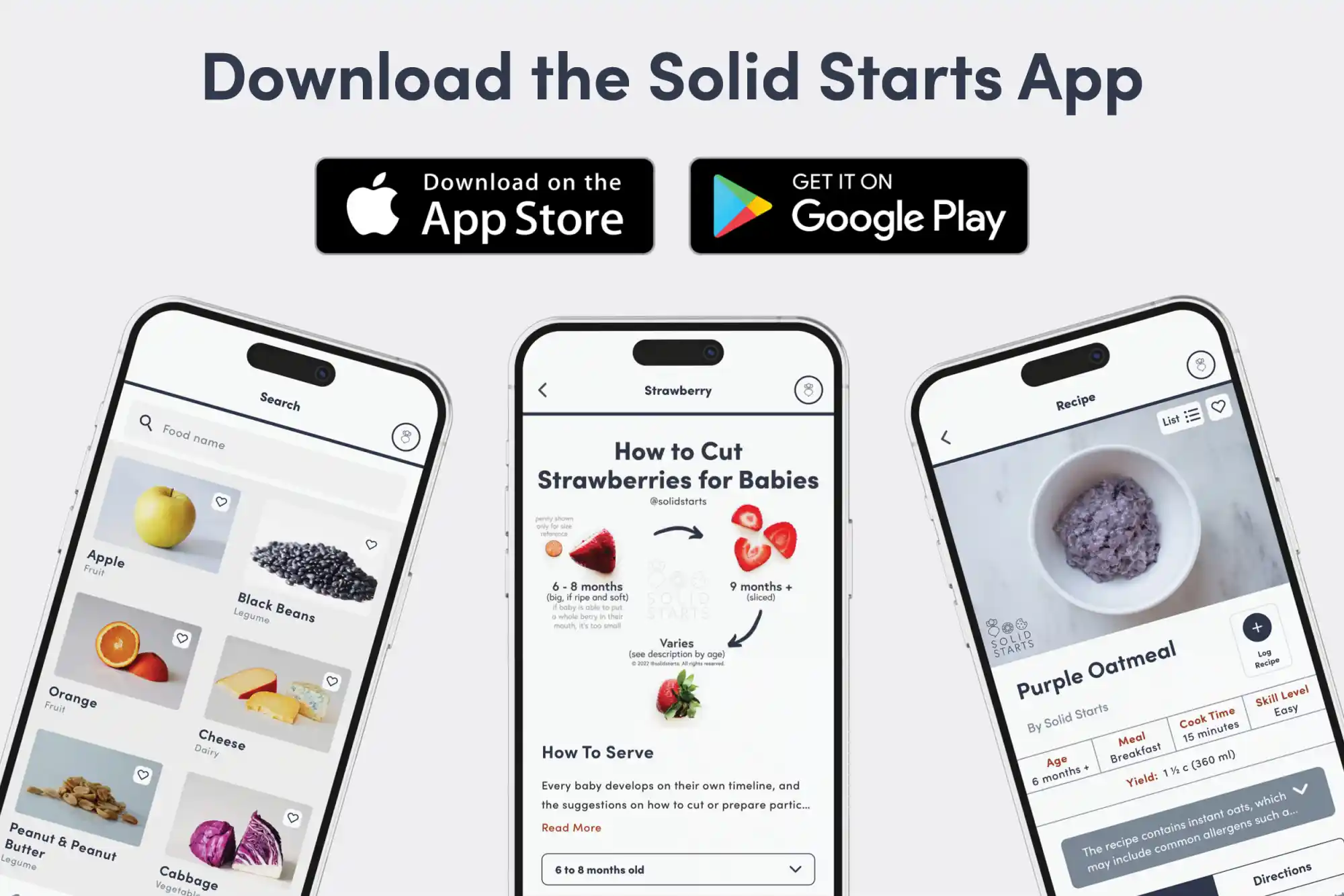Access our First Foods® Database in the Solid Starts App.
Learn moreFennel
Vegetable
Age Suggestion
6 months
Iron-Rich
No
Common Allergen
No

When can babies have fennel?
Fennel, including the bulb, fronds, flowers, and seeds, may be introduced as soon as baby is ready to start solids, which is generally around 6 months of age.
Today, fennel thrives in sandy fields, on riverbanks, and by roadsides in sunny areas around the world, but the plant originated in the fertile lands around the Mediterranean Sea. This perennial herb has a long history in the region, where ancient Egyptians and Romans cultivated fennel for food, medicine, and ceremonial purposes. Fennel was also important in ancient Chinese, Hindu, and Persian cultures of Asia, where most fennel is produced as food. Fennel is a key ingredient throughout the diverse cuisines of the continent. The bulb-like stem, stalks, and fronds (those lacy leaves) are eaten cooked or raw, while the flowers and seeds are ground up to season braises, sauces, stews, and spice blends like dukkah, five-spice powder, garam masala, panch phoron, and za’atar.
How do you serve fennel to babies?
Every baby develops on their own timeline, and the suggestions on how to cut or prepare particular foods are generalizations for a broad audience.
6 months old +:
Cut the outer layers of large fennel bulbs into large wedges and cook until soft for baby to grab, hold, and munch on. Alternatively, use a small amount of fennel seed to season a soft, scoopable food, such as dal, kitchari, or your favorite grain porridge. You can use the fennel leaves (also known as fronds) in the same way: simply finely chop and mix them into mashed vegetables, yogurt, or another scoopable food. If you would like to serve homemade fennel puree to baby, make sure to use immediately and discard any leftovers, as storing the puree can allow unsafe levels of nitrates to build up in the food.
9 months old +:
Around this age, babies develop their pincer grasp (where the thumb and forefinger meet), which enables them to pick up smaller pieces of food. When you see signs of this development, try offering small, bite-sized pieces of cooked fennel or grated raw fennel. Cook with fennel seed as desired.
12 months old +:
Offer fennel bulb in ways that encourage biting and tearing practice: offer either large wedges or thin slices of cooked, soft fennel bulb, or long, flat slices of raw fennel. Once a toddler understands directions and you feel comfortable with the child’s eating skills, closer to the second birthday, you can try offering raw fennel that has been cut into sticks and model how to take bites.

Videos
Is fennel a choking hazard for babies?
Yes. Fennel bulb, especially when raw or undercooked, is firm and challenging to chew, qualities that increase the risk of choking. To reduce the risk, prepare and serve fennel in an age-appropriate way as described in the How to Serve section. As always, make sure you create a safe eating environment and stay within an arm’s reach of baby during meals.
Learn the signs of choking and gagging and more about choking first aid in our free guides, Infant Rescue and Toddler Rescue.
Is fennel a common allergen?
No. Allergies to fennel are rare but have been reported. Ingestion, inhalation, and topical exposure to fennel have been associated with allergic reactions in certain individuals. Individuals with Oral Allergy Syndrome (also known as pollen food allergy syndrome), particularly those who are allergic to birch or mugwort pollen, sensitive to foods within the Apiaceae family (such as carrot and celery), or sensitive to peaches, may also be sensitive to fennel. Oral Allergy Syndrome typically results in short-lived itching, tingling, or burning in the mouth and is unlikely to result in a dangerous reaction. Cooking fennel can help minimize the reaction.
As you would when introducing any new food, start by offering a small quantity of fennel for the first few servings. If there is no adverse reaction, gradually increase the quantity over future meals.
Is fennel healthy for babies?
Yes. Fennel offers fiber, fluid, folate, magnesium, and potassium, as well as vitamins C and K. It also contains phytonutrients which are plant compounds that offer antioxidant and digestive benefits. Together, these nutrients support baby’s digestion, hydration, development, electrolyte balance, iron absorption, blood clotting, and bone density.
When serving fennel, refrain from serving homemade fennel puree to babies younger than 6 months of age. If serving to infants older than 6 months, wash the vegetable well before preparing, and serve immediately. Do not store fennel puree. Nitrates can increase to high levels in purees with improper handling and storage.
Can fennel extract or gripe water help relieve colic in babies?
Yes. Some preliminary research has shown that, when used appropriately, gripe water (which often contains fennel) and fennel extracts (when diluted with water) may help relieve symptoms of infant colic. That said, causes of colic can be varied and complex, so talk to your pediatric healthcare provider before offering any treatments to baby.
When can babies have fennel tea?
After the first birthday, you can offer fennel tea in a cup–just make sure it is no longer hot before serving. Do not give tea or beverages besides breast milk, formula, or small amounts of water to babies under 12 months of age.
Do I need to worry about nitrates in fennel?
No. Feel free to offer vegetables that contain nitrates (arugula, beets, carrots, lettuce, spinach, and squash to name a few) as part of a variety of foods in the diet. Nitrates are naturally-occurring compounds which, if consumed in excess, may negatively affect oxygen levels in the blood. That said, babies who are allowed to self-feed typically do not consume excessive amounts of solid food because they need lots of practice to learn how to eat it. Nitrates in vegetables are generally not a cause for concern, and the benefits of introducing vegetables that are high in nitrates as part of a balanced diet typically outweigh the unlikely risk of excessive consumption.
To reduce nitrate exposure, avoid consumption of untested well water and take care with purees. When possible, avoid homemade purees made with higher nitrate vegetables, like fennel, that are stored for more than 24 hours and commercial purees not consumed within 24 hours of opening. Higher nitrate vegetables include arugula, beets, carrots, lettuce, spinach, and squash, among others.
Our Team
Written by
Expert Tips Delivered to Your Inbox
Sign up for weekly tips, recipes and more!
Copyright © 2026 • Solid Starts Inc







